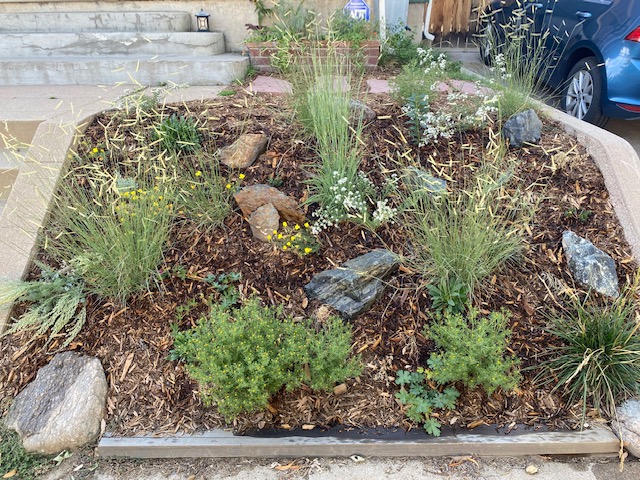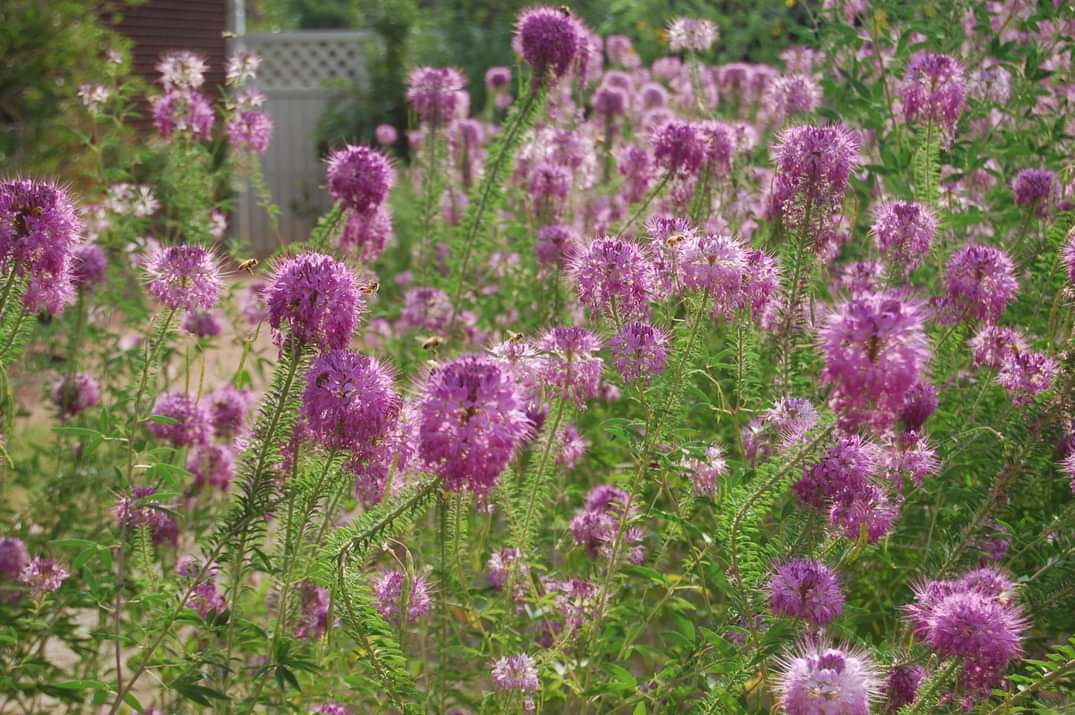NATIVE PLANTS & SEEDS
There are quite a few Colorado nonprofits that maintain public lists of where to buy native plants and seeds! Check out this list by Wild Ones Front Range or this list by the CO Native Plant Society.
The easiest way to get plants is using our Native Garden-In-A-Truck service!
Our favorite retail nursery is the High Plains Environmental Center in Loveland. We can’t say enough good things about HPEC. They have beautiful native plant demonstration gardens, and rare native wildflowers for sale that can’t be found elsewhere. The HPEC nursery uses all locally-harvested seeds, and the profits from their sales go to education and conservation. In our experience, their plants often establish and bloom faster than normal nursery plants. This may be because HPEC grows their plants in small deep pots filled with mycorrhizal soil and watered from the bottom, which helps natives start their lives with deep taproots.
Our favorite retailer for native seeds is Western Native Seed. They organize their seeds by ecosystem, and provide seed mixes for all kinds of different backyards!
GRANTS
Landscaping with CO Native Plants Conference – Native Garden Grants. (This yearly conference is awesome.)
CONPS – Native Plant Garden Grants and Research Grants
Wild Ones – Seeds for Education Grants
PPAN – Protect Our Pollinators Habitat Fund
Northern Water – Grants for low-water landscapes owned by cities, non-profits, businesses, schools, multi-family complexes, HOAs, etc..
CO Garden Foundation – horticulture-related Grants
Growing Spaces – list of U.S. Garden Grants
IRRIGATION
Denver Water – Water-Wise Landscaping Handbook
CSU Extension – Water Wise Tips and tips for Efficient Landscape Irrigation
Resource Central – Sprinkler Evaluations
Irrigation Guides – there are a lot out there, including IrrigationTutorials.com.
LANDSCAPING MATERIALS
Weed Barriers
-
-
-
- Recycled cardboard rolls: X-board at Home Depot
- Recycled paper rolls: builder paper at Home Depot, Ace, or Lowe’s
- Other weed barriers: straw blankets, coir blankets, or corn-based weed fabric
-
-
Mulches, chip rock, soil, path materials, rocks, etc.:
-
-
-
- Bedrock Landscaping Materials
- Ewing Outdoor Supply (also has irrigation supplies)
- Pioneer
- There are a lot of smaller companies as well. Search your area on Google Maps for “landscape supply.”
-
-
Wood Chips
-
-
-
- Chip Drop
- Or send a message to your nearest arborist to ask them for a chip drop!
-
-
Rocks and Boulders
-
-
-
- High Plains Stone, Bedrock Landscaping, Ewing Outdoor Supply
-
-
Goats for weeding: Send us a message, we know the people.
NONPROFITS in the CO NATIVE PLANT LANDSCAPING COALITION
Wild Ones Front Range is dedicated to “neighbors helping neighbors plant native plants.” They have a lot of great resources for DIYers, including native plant and seed swaps/giveaways that they co-organize with other nonprofits in the Coalition! Eryn, our leader here at RLD, volunteers for WOFR.
The Colorado Native Plant Society also has some amazing resources for gardening with native plants, including a yearly plant sale! We especially appreciate their breakdown of different Colorado life zones/ habitats.
Love birds? Search the Audubon website for the native plants that are most critical to birds in your area, or check out the Denver Audubon or Rocky Mountain Audubon chapters to learn more about creating bird habitat in Colorado.
Love pollinators? Check out the People and Pollinators Action Network, a group that fights to sustainably manage CO land, safeguard public health, and preserve biodiversity.
Love wildlife in general? Check out the CO Wildlife Foundation to find out how you can help conserve our local wildlife habitat.
SPECIFIC PLANTS FOR SPECIFIC PURPOSES
You can use the National Wildlife Foundation search tool to find the plants most critical for butterflies and moths in your area. These plants are pillars for birds and the rest of the food chain as well, because caterpillars – as the filet mignon of the insect world – are the best baby bird food! For more locally-focused research on butterfly host plants, turn to CSU Extension’s resources or the Butterfly Pavilion, which also studies the habitat needs of CO fireflies, tarantulas, and dragonflies.
If you’re building a food forest, this master sheet of Colorado-hardy edible plants may be helpful.
Feel free to use and share our spreadsheet on the plants that support the most native specialist bees in Colorado.
Want to help us collate information about the ethnobotanic uses and habitat benefits of CO native plants? Help us add to the public Denver-Area Native Plants Spreadsheet!
OTHER COLORADOSCAPING LANDSCAPERS
Let us know if you know of any businesses that should be added to our list of ecological landscapers! We also co-admin a private Facebook group where we share advice and support with other commercial Coloradoscapers; if that’s you, please reach out.
CERTIFICATION
One of the best things you can do to protect your landscape, both from critical neighbors and from future occupants who may have different aesthetics, is to get certified as a habitat-friendly garden and post a sign showcasing that. There are a few different programs that do this:
Many of our gardens are certified through these programs; we’re happy to help you craft a garden that will meet the requirements.
You can also get on the Homegrown National Park map for free! Or consider starting a Pollinator Pathway here in Colorado.
RECOMMENDED READING
Nature’s Best Hope and Bringing Nature Home by Douglas Tallamy
Braiding Sweetgrass by Robin Wall Kimmerer
Prairie Up! and A New Garden Ethic by Benjamin Vogt
Sand Talk by Tyson Yunkaporta
Iwigara: American Indian Ethnobotanical Traditions and Science by Enrique Salmon
Suburbitat: A Guide To Restoring Nature Where We Live by Jim Tolstrup

